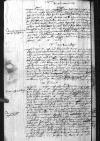Unser(r) negst ⌊⌋, den superinscribed⌈denden superinscribed⌉ XXIIII dis negst vorschinen text damaged⌈[n]n text damaged⌉ Februarii / an E(wer) E(rbarkei)t ausgang(en) neben(n) unsers ⌊ohmen(n)⌋ von text damaged⌈[n]n text damaged⌉ ⌊Rom⌋ briff, / wirt E(wer) E(rbarkei)t etwan(n), wie nicht unbillich, on the margin⌈wie nicht unbillich,wie nicht unbillich, on the margin⌉ betrubt habn(n). / Wir sein aber hidden by binding⌈[er]er hidden by binding⌉ der zuvorsicht, / das sich die gotlichen willen(n) mit gedult superinscribed in place of crossed-out bisher⌈bisher mit gedult mit gedult superinscribed in place of crossed-out bisher⌉ undergebn(n), / und hidden by binding⌈[nd]nd hidden by binding⌉ habn(n) bisher gewartet, / ob E(wer) E(rbarkei)t unsern(n) ohmen(n) widerum(m)b gen hidden by binding⌈[en]en hidden by binding⌉ Rom heth wollen(n) schreiben(n) etc. Um(m)b die dreissig hungerische hidden by binding⌈[che]che hidden by binding⌉ guld(en), die ir uns zugeschickt / und die wir gen(n) an die ⌊Fug[...] hidden by binding⌈[...][...] hidden by binding⌉schen⌋ vorschriben(n), / hab wir noch kein kuntschafft. Was hidden by binding⌈[as]as hidden by binding⌉ uns derhalb(en) wirt zukomen(n), wolle wir E(wer) E(rbarkei)t mit den ersten hidden by binding⌈[sten]sten hidden by binding⌉ nicht vorhalt(en) etc. Uns sein gestrigs tags von ko(nigliche)n hove disse hidden by binding⌈[e]e hidden by binding⌉ beigelete brive[1] in E(wer) E(rbarkei)t ⌊bruders⌋ sachen, die wir zcu(?) gefurdert on the margin⌈die wir zcu(?) gefurdertdie wir zcu(?) gefurdert on the margin⌉, / zukomen(n), / wollen hidden by binding⌈[en]en hidden by binding⌉ die selbt(en) mit unserm(m) schreiben(n) an in gestelt losse bestellen(n). Ouch hab wir negst durch superinscribed in place of crossed-out mit⌈mit durch durch superinscribed in place of crossed-out mit⌉ dennn written over m⌈mnn(n)nnn written over m⌉ edlen, wolgeborn(en) h(e)rn ⌊elbingschen hidden by binding⌈[chen]chen hidden by binding⌉ castellan(n)⌋ etc. E(wer) E(rbarkei)t beger des dorffs halb(en) etc. mit sondren(n) fleissig(en) bitten(n) an ⌊ko(niglich)e written over r⌈ree written over r⌉ m(ajeste)t⌋, u(nsern) a(llergnedigsten) h(e)rn, lossen anbringen(n) solchs h superinscribed in place of crossed-out darzu⌈darzu solchs h[...] hidden by binding⌈[...][...] hidden by binding⌉ solchs h superinscribed in place of crossed-out darzu⌉ euch hidden by binding⌈[h]h hidden by binding⌉ gemelter h(er) ⌊castellan(n)⌋ / vortzustellen(n) hot zugesagt, / derwe[...] hidden by binding⌈[...][...] hidden by binding⌉ wir in gutter hoffnung sein. / Was erlangt wirt, / s[...] hidden by binding⌈[...][...] hidden by binding⌉ E(wer) E(rbarkei)t nicht unangeczeigt bleibn(n). / Der wir vil ehr(e) und hidden by binding⌈[d]d hidden by binding⌉ nucz zuschaff(en) / geneigth uns superinscribed⌈unsuns superinscribed⌉ erbitt(en) und willig. / Gotlichn(n) gnaden hidden by binding⌈[aden]aden hidden by binding⌉ befolen(n). /

 AAWO, AB, D. 7, f. 46v (b.p.)
AAWO, AB, D. 7, f. 46v (b.p.)